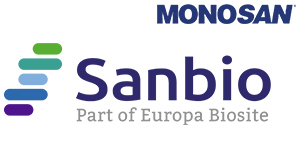Mouse anti-H-FABP, clone 66E2 (Monoclonal)
Mouse anti-H-FABP, clone 66E2 (Monoclonal)
Artikelnummer
SANMON2019
Verpackungseinheit
1 ml
Hersteller
Sanbio / Monosan
Verfügbarkeit:
wird geladen...
Preis wird geladen...
Clone Number: 6600
Immunogen: Unknown or proprietery to MONOSAN and/or its suppliers
Concentration: 100 ug/ ml
Storage buffer: PBS with 0.1% BSA and 0.02% sodium azide
Additional info: The monoclonal antibody 66E2 recognizes human heart fatty acid binding protein (H-FABP) of both natural and recombinant origing. The H-FABP protein is derived from the human FABP3 gene. FABPs are small intracellular proteins (~13-14 kDa) with a high degree of tissue specificity that bind long chain fatty acids. They are abundantly present in various cell types and play an important role in the intracellular utilization of fatty acids, transport and metabolism. There are at least nine distinct types of FABP, each showing a specific pattern of tissue expression. Due to its small size, FABP leaks rapidly out of ischemically damaged necrotic cells leading to a rise in serum levels. Ischemically damaged tissues are characterized histologically by absence (or low presence) of FABP facilitating recognition of such areas. H-FABP is localized in the heart, skeletal and smooth muscle, mammary epithelial cells, aorta, distal tubules of the kidney, lung, brain, placenta, and ovary. The monoclonal antibody 66E2 stains heart muscle cells and striated skeletal muscle cells in immunohistology. It can be used to detect ischemia areas of human heart. It is also useful as marker for brain damage. Furthermore, this antibody is useful for the purification of H-FABP.
References: Roos; W et al. J Immunol Meth 1995; 183: 149/Guillaume, E et al Proteomics 2003, 3: 1495/Zimmermann-Ivol; C et al. Mol Cell Proteomics 2004; 3: 66
Immunogen: Unknown or proprietery to MONOSAN and/or its suppliers
Concentration: 100 ug/ ml
Storage buffer: PBS with 0.1% BSA and 0.02% sodium azide
Additional info: The monoclonal antibody 66E2 recognizes human heart fatty acid binding protein (H-FABP) of both natural and recombinant origing. The H-FABP protein is derived from the human FABP3 gene. FABPs are small intracellular proteins (~13-14 kDa) with a high degree of tissue specificity that bind long chain fatty acids. They are abundantly present in various cell types and play an important role in the intracellular utilization of fatty acids, transport and metabolism. There are at least nine distinct types of FABP, each showing a specific pattern of tissue expression. Due to its small size, FABP leaks rapidly out of ischemically damaged necrotic cells leading to a rise in serum levels. Ischemically damaged tissues are characterized histologically by absence (or low presence) of FABP facilitating recognition of such areas. H-FABP is localized in the heart, skeletal and smooth muscle, mammary epithelial cells, aorta, distal tubules of the kidney, lung, brain, placenta, and ovary. The monoclonal antibody 66E2 stains heart muscle cells and striated skeletal muscle cells in immunohistology. It can be used to detect ischemia areas of human heart. It is also useful as marker for brain damage. Furthermore, this antibody is useful for the purification of H-FABP.
References: Roos; W et al. J Immunol Meth 1995; 183: 149/Guillaume, E et al Proteomics 2003, 3: 1495/Zimmermann-Ivol; C et al. Mol Cell Proteomics 2004; 3: 66
| Artikelnummer | SANMON2019 |
|---|---|
| Hersteller | Sanbio / Monosan |
| Hersteller Artikelnummer | MON2019 |
| Green Labware | Nein |
| Verpackungseinheit | 1 ml |
| Mengeneinheit | STK |
| Reaktivität | Human, Mouse (Murine), Rat (Rattus), Pig (Porcine) |
| Klonalität | Monoclonal |
| Methode | Immunohistochemistry (frozen), Immunoprecipitation, Western Blotting, ELISA |
| Isotyp | IgG1 |
| Wirt | Mouse |
| Produktinformation (PDF) | Download |
| MSDS (PDF) |
|

 English
English







